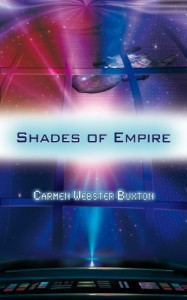Familiar Diversions
I'm a librarian who loves anime, manga, and reading a wide variety of genres.
Currently reading
Shades of Empire by Carmen Webster Buxton

What attracted me to this book was the author's description of it – multiple interesting-sounding characters whose paths intersect, plus lots of potential for political intrigue. Sadly, although it did turn out to be an interesting read, it's probably my least favorite of Buxton's works so far. The main reason for that? Two words: rape fatigue.
One male character was raped, but, for the most part, women had it worse. In this book, if you were female, you were probably either raped or threatened with rape. On-page rape was relatively rare and I don't recall any of it being graphically described. There were just so many references to rape, period. A woman in the Emperor's harem who tried to run away was raped by a monster as punishment. Antonio, the Emperor's son, wasn't fit to be around human beings – not only was he a rapist, he was an incestuous rapist. Maddy, the captain of a merchant spaceship, was threatened with rape by one of her crew members. Girls in villages like the one Alexander, one of the Emperor's Own Corps of Guards, grew up in all lived with the threat of rape and were sometimes scarred by their own parents in an effort to avoid being captured and put to work as prostitutes. The list goes on. It probably didn't help that I started reading this shortly after I stalled on the first season of Game of Thrones, outraged that the writers had inserted rape scenes where the book had had none.
Moving on. The book takes a while to get going, and I thought the second half was more interesting that the first. By the second half, all the players were finally in motion and (mostly) had all their cards on the table for readers to see. There were several storylines, but they all tied together in one way: could the Emperor be overthrown without throwing the Empire into complete chaos or putting someone worse in his place? Readers got a look at the players involved in pretty much every aspect of the conflict: the rebels, those aiding the rebels, and the Imperial family. The various storylines could, for the most part, be mapped to the book's various romantic relationships.
Initially, my favorite romantic couple was Maddy and Thad, because of all that lovely romantic tension brewing just under the surface. When they became an actual couple (sort of), I grew less interested in them and eventually came to prefer Peter Barranca and the mystery woman he was required to sleep with in order to hide the fact that his marriage was a sham. In general, Peter was my favorite character, and probably another reason why I preferred the second half of the book to the first.
Although having all those characters in the book meant that readers had lots of “favorite character” and “favorite hated character” options, one drawback was that the characters weren't explored in the kind of depth I would have liked. I felt like I knew many of the characters in only a surface-level kind of way, with Alexander being one of the biggest exceptions. I understood Cassandra a little better near the end of the book, after she told Alexander a little about how the way she grew up affected her, but I would have liked to have had more of that earlier on.
Antonio, Vinitra, and Paznowski were other characters I would have liked to understand better. Okay, so Antonio was a human cesspool, but was he always that way? He was clearly worse than his father. Vinitra was unbelievably passive and so bent to Antonio's will that she might as well have been his puppet. How did Antonio manage to warp her that badly, considering that the Empress did everything she could to stand in his way? And Paznowski. There was an attempt to explain him and his devotion to Antonio, but I didn't buy it. He seemed too smart to put himself under the thumb of a guy like Antonio. It didn't help that I couldn't wrap my brain around the idea of a relatively undamaged person being at all attracted to a guy like Antonio.
I actually expected more intrigue and betrayal than I got – for a good chunk of the book, I steeled myself for either Vinitra or Paznowski, or both, to suddenly reveal that they weren't as devoted to Antonio as they seemed. With Vinitra, I think I was hoping she'd become something less pitiful. Paznowski was just a disappointment. He was far more cunning than Antonio, and the way his story ended was a huge waste of potential.
The ending is written as being a primarily happy one. I kind of wish there had been a “X years in the future” ending that at least showed the fate of the empire, since I wasn't convinced that its many years of corruption had truly ended. The way the various couples' romances were resolved worked for me, though, even when they were resolved in a more open-ended way.
Other Comments:
- I really, really could have done without Antonio and Vinitra's on-page sex scene. It was definitely a brain bleach moment.
- Although her sexual "policies" weren't my cup of tea, some readers may find Maddy's views on sex to be refreshing. She feels free to have sex as often as she likes, and what happens in the bedroom doesn't need to affect what happens at work. For example, she can have sex with a crew member one day and reprimand him for screwing up on the job the next. She's consistent enough that no crew member expects her to behave otherwise.
- Those who are particularly sensitive towards representations of autistic characters may have issues with parts of the beginning of the book. I've only ever met a couple autistic people, so I'm not the best judge, but I was bothered that several characters seemed to equate "stupid" with "autistic," even after they said they didn't.
(Original review, with read-alikes, posted on A Library Girl's Familiar Diversions.)
 1
1












